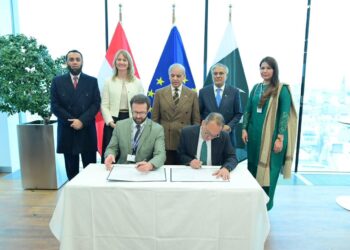In a significant diplomatic development, Pakistan has officially welcomed the landmark peace agreement signed between Azerbaijan and Armenia. The accord, which was facilitated by the United States under the leadership of President Donald Trump, is being hailed as a turning point in the decades-long conflict between the two South Caucasus nations.
Prime Minister Shehbaz Sharif’s Statement on the Peace Deal
Prime Minister Shehbaz Sharif expressed his appreciation for the historic agreement through a message posted on his official account on X (formerly Twitter). In his statement, he congratulated President Ilham Aliyev of Azerbaijan and the people of Azerbaijan for achieving what he called a “new era of peace, stability, and cooperation” in the region.
“This historic agreement marks the beginning of a new chapter for both countries,” the Prime Minister stated, emphasizing Pakistan’s steadfast support for Azerbaijan’s sovereignty and territorial integrity over the years.
He also highlighted that the role of the United States in facilitating this dialogue deserves recognition, adding that President Donald Trump’s mediation was instrumental in bridging gaps between the two rival nations.
Background of the Azerbaijan–Armenia Conflict
The conflict between Azerbaijan and Armenia centers primarily around the Nagorno-Karabakh region, a mountainous area internationally recognized as part of Azerbaijan but with a majority ethnic Armenian population.
- Origins of the Dispute
The roots of the conflict stretch back to the late Soviet era in the 1980s when ethnic tensions and nationalist sentiments flared up. The dissolution of the Soviet Union in 1991 escalated the dispute into a full-scale war, resulting in tens of thousands of deaths and the displacement of over a million people. - First Nagorno-Karabakh War (1988–1994)
The war ended in 1994 with a Russian-brokered ceasefire, but Armenia had taken control of Nagorno-Karabakh and several surrounding districts of Azerbaijan. This occupation was never recognized internationally. - Renewed Clashes and the 2020 War
In 2020, a new six-week war broke out, leading to Azerbaijan reclaiming significant territories, including parts of Nagorno-Karabakh. This was seen as a major turning point in the regional balance of power. - 2023 Developments
In October 2023, following a swift Azerbaijani military operation, ethnic Armenian separatists in Nagorno-Karabakh disarmed and announced plans to dissolve their self-declared government, effectively ending decades of separatist rule.
Details of the New Peace Agreement
The latest peace deal was signed at the White House in Washington, D.C., with President Ilham Aliyev of Azerbaijan and the Prime Minister of Armenia present. President Donald Trump, who played the role of chief mediator, also signed the agreement as a witness.
The key points of the agreement include:
- Immediate and Complete Ceasefire
Both nations have pledged to halt all military operations and withdraw any forces from contested territories. - Economic and Trade Cooperation
The two countries have agreed to open trade routes, establish joint economic projects, and promote cross-border investments to strengthen mutual prosperity. - Technology and Artificial Intelligence (AI) Collaboration
The agreement contains a groundbreaking provision for cooperation in emerging technologies, particularly artificial intelligence, signaling a forward-looking approach to bilateral relations. - Commitment to Peaceful Dialogue
Both sides have agreed to resolve any future disputes through diplomatic channels rather than military confrontation.
Statements from US President Donald Trump
During a joint press conference following the signing ceremony, President Trump declared:
“Azerbaijan and Armenia have chosen to prioritize trade over conflict, prosperity over hostility, and the future over the past. This is a win for both nations and for global peace.”
He reiterated his personal message to both leaders: “Don’t fight — trade.” According to Trump, the spirit of economic cooperation embedded in the agreement will serve as the foundation for a lasting peace.
Pakistan’s Historical Support for Azerbaijan
Pakistan has historically maintained close diplomatic and defense ties with Azerbaijan. It has been one of the few countries that never recognized Armenia due to the Nagorno-Karabakh conflict. Over the years, Pakistan has consistently supported Azerbaijan’s stance in international forums, including the United Nations and the Organization of Islamic Cooperation (OIC).
In return, Azerbaijan has also expressed solidarity with Pakistan on key issues, particularly over the dispute in Jammu and Kashmir.
Regional and Global Reactions
The peace agreement has drawn mixed reactions globally:
- Turkey – A close ally of Azerbaijan, welcomed the deal and praised it as a “victory for peace.”
- Russia – While Russia had previously played a major role in mediating the conflict, it cautiously welcomed the US-brokered agreement, stating that any step toward stability in the Caucasus is positive.
- European Union – The EU expressed hope that the agreement would pave the way for broader regional cooperation and integration.
Potential Benefits of the Peace Deal
Experts believe that this agreement could lead to several long-term benefits:
- Economic Growth
Opening trade routes and economic cooperation will boost GDP growth in both nations. - Regional Stability
The South Caucasus could become a hub for trade connecting Europe and Asia, particularly through the proposed Middle Corridor transport routes. - Humanitarian Relief
The peace deal could facilitate the return of displaced persons and the rebuilding of war-torn areas. - Technology Partnerships
Collaboration in AI and other advanced sectors could accelerate modernization and create new job opportunities.
Challenges Ahead
While the peace agreement is historic, challenges remain:
- Public Sentiment – Decades of hostility mean that mistrust among the populations of both countries will take time to heal.
- Implementation of Agreements – Past ceasefire deals have failed due to violations; effective monitoring will be crucial.
- Regional Power Politics – The influence of Russia, Turkey, and Iran in the Caucasus could impact the agreement’s durability.
Conclusion: A New Dawn for the South Caucasus
The peace agreement between Azerbaijan and Armenia, welcomed warmly by Pakistan, represents more than just a ceasefire — it is an opportunity to redefine the future of the South Caucasus. With trade, technology, and diplomacy replacing decades of warfare, the region now has a chance to emerge as a hub of stability and cooperation.
Prime Minister Shehbaz Sharif’s endorsement of the deal reflects Pakistan’s commitment to supporting peace initiatives worldwide, especially those involving its close allies. The coming months will reveal whether this agreement can overcome historical animosities and deliver the promised prosperity to both nations.

























